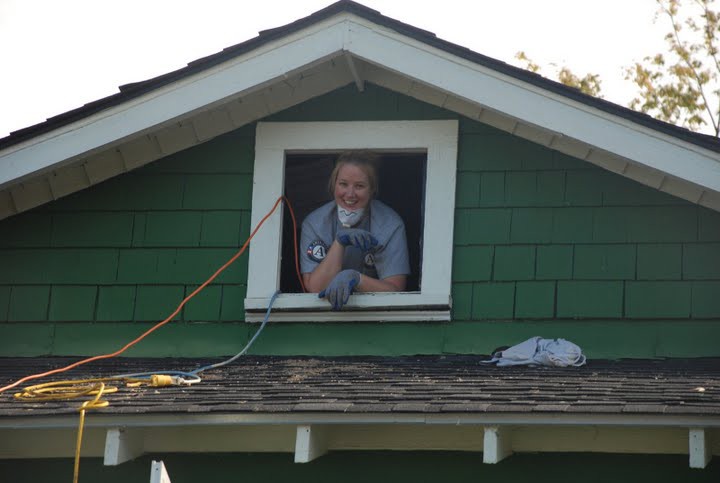by Katie Onheiber
Our homes, our health and our environment are incredibly interconnected. Does that pesky cold continue to linger? A moldy basement may be the culprit. Has your heating bill skyrocketed? A leaky air duct may be to blame. Does your basement flood after a big storm? The landscape around your home may be the problem.
Certification programs like LEED and Green Built NC are great for determining how green a new home is, but most of the region’s housing stock doesn’t fit that description. The Western North Carolina Green Building Council’s Green Gauge program helps families figure out how to make already built homes greener and healthier.
In order to thrive, everyone needs a healthy and safe place to live. Green Gauge provides affordable assessments of existing homes, recommends improvements and connects residents to green building industry professionals who can help.
By offering a clear and straightforward approach, we’re dispelling the myth that greening your home is time- and money-consuming. Green Gauge accurately assesses how green a home actually is. It’s the perfect comparison tool for buyers or sellers of green homes and for homeowners and renters needing recommendations on how to make their home healthier for their families and the environment.

The first program of its kind in North Carolina, Green Gauge is now being expanded statewide, thanks to support from the Z. Smith Reynolds Foundation and a partnership with the U.S. Department of Energy. This will help residents across North Carolina save money, reduce energy use and live in better homes.
Green Gauge participants receive an assessment designed to provide a greater understanding of various factors:
- Energy use: heating and air conditioning, lighting, appliances, insulation.
- Water use: sinks, showers, appliances.
- Materials sustainability: flooring, cabinets, decking.
- Indoor air quality: mold, radon, chemical emissions.
- Site: walkability, native and edible plants, stormwater management.
By 2020, the WNC Green Building Council aims to have assessed 3,000 Tar Heel homes and retrofitted 750, saving 1 million kilowatt-hours of electricity annually. This program can easily cut individual energy use by 15 percent, saving homeowners hundreds of dollars a year.
The one-page assessment includes a Home Energy Score report analyzing your home’s energy performance and how it compares with other homes in the region. The report also includes recommendations for improvement and spells out what you can do to reduce energy costs.
A positive assessment can provide a marketing advantage for those wishing to sell an energy-efficient home; Green Gauge can also help potential buyers make an informed decision about a home’s true cost, including future utility bills. All the information is tracked in a secure, private database that homeowners can access and update over time. No matter who owns the home, the information will always be available.
Understanding your home better enables you to make informed decisions that will save you money on utility bills, improve your indoor air quality, minimize environmental impacts and improve your landscape.
The WNC Green Building Council began 16 years ago as a casual gathering of five building professionals with a common desire to educate people about the health and environmental impacts of design and construction. Today, it has grown into a nonprofit with statewide programs. We offer educational workshops to industry professionals and the general public, provide programs that certify and evaluate green homes, and promote and connect industry professionals with clients. Our annually published Green Building Directory includes resources and articles on building and living a greener and healthier life.
Together, these programs are helping create a healthier community and environment. Call us to sign up for your personal Green Gauge assessment.
Katie Onheiber is the WNC Green Building Council’s membership, events and education coordinator. To learn more about Green Gauge, contact Executive Director Sam Ruark-Eastes (sam@wncgbc.org; 254-1995).




Before you comment
The comments section is here to provide a platform for civil dialogue on the issues we face together as a local community. Xpress is committed to offering this platform for all voices, but when the tone of the discussion gets nasty or strays off topic, we believe many people choose not to participate. Xpress editors are determined to moderate comments to ensure a constructive interchange is maintained. All comments judged not to be in keeping with the spirit of civil discourse will be removed and repeat violators will be banned. See here for our terms of service. Thank you for being part of this effort to promote respectful discussion.